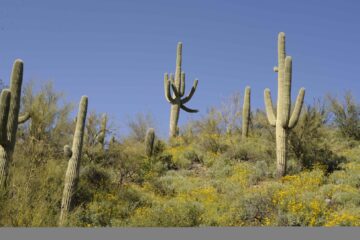Franciscan Friar Fr. Paul Gallagher reflects on the Gospel text for the Third Sunday of Advent. What is it you hope when we talk about the coming reign of God?
The content is edited by Franciscan Sister of Christian Charity Sister Anne Marie Lom and Joe Thiel. The excerpts from the Sunday readings are prepared by Joe Thiel. To read or download the complete pdf with excerpts for your prayer, please click here Franciscan Gospel Reflection December 17 2023. Excerpts are from the Lectionary for Mass for Use in the Dioceses of the United States of America, second typical edition © 2001, 1998, 1997, 1986, 1970 Confraternity of Christian Doctrine, Inc., Washington, DC. Used with permission. All rights reserved. No portion of this text may be reproduced by any means without permission in writing from the copyright owner. Photo: Gentry George, U.S. Fish and Wildlife Service, Public domain, via Wikimedia Commons; St Peter Mission, Bapchule, Arizona
John 1:6-8, 19-28
A man named John was sent from God. He came for testimony, to testify to the light, so that all might believe through him. He was not the light, but came to testify to the light.
And this is the testimony of John. When the Jews from Jerusalem sent out priests and Levites to him to ask him, “Who are you?” He admitted and did not deny it, but admitted, “I am not the Messiah.” So they asked him, “What are you then? Are you Elijah?” And he said, “I am not.” “Are you the Prophet?” He answered, “No.” So they said to him, “Who are you, so we can give an answer to those who sent us? What do you have to say for yourself?” He said: “I am ‘the voice of one crying out in the desert, “Make straight the way of the Lord,”’ as Isaiah the prophet said.”
Some Pharisees were also sent. They asked him, “Why then do you baptize if you are not the Messiah or Elijah or the Prophet?” John answered them, “I baptize with water; but there is one among you whom you do not recognize, the one who is coming after me, whose sandal strap I am not worthy to untie.” This happened in Bethany across the Jordan, where John was baptizing.
Background:
John’s father, Zechariah, was a highly respected rural priest. In a society where a person’s role and status in the community was largely determined by one’s family, John was acting out of character. He should have been acting like a respectable member of a priestly family and following in his father’s footsteps. However, his behavior was more like one of the disgruntled priests who became separated from the aristocratic priests of temple in Jerusalem. Their wealth and lifestyle alienated them from some of the rural priests. John’s appearance and way of life seemed more typical of those who had assumed the role of a prophet, living apart from the religious leaders of the day.
Like a prophet, John spoke the desire of God: that they should live more faithfully their relationship with God. John’s baptism was a sign of a person’s repentance. Baptisms were common and had a variety of meanings. Naaman’s washing in the Jordan would have been understood as a kind of baptism (2 Kings 5:14). A high priest was required to participate in a rite of purification before and after rites of atonement (Leviticus 16:4). Women were required to perform a form of baptism after their menstruation (Leviticus 15). So, it is not so unusual that John’s presence has raised some questions for the religious authorities.
The priests and Pharisees have come to John to discover who he is. Who is this person, out in the desert, calling people to repentance and baptizing? He tells them that he is not the Messiah, Elijah, or the Prophet. At this time, there was no clear understanding of who the Messiah might be or even what kind of role the Messiah would play. The term messiah means “anointed one.” In their history, the Jews had anointed people for a variety of reasons. Kings, priests and some prophets had been anointed.
There were those among John’s followers, and among the people, who believed that the Baptist himself was the Messiah. Nevertheless, John denied that he was the Messiah no matter how one understood that term. He did say that there was one among them so great that he was not worthy to undo his sandals, the role of one’s lowliest servant.
Reflection Questions:
- What is it you hope when we talk about the coming reign of God?
- Have there been times when people expected a certain kind of behavior or ability from you because they knew your family?
- Have you encountered people who you find difficult to understand, or who cause you to be confused by their words or actions?
- The religious leaders of the day went out to John, asking, “Who are you?” If you were asked this same question today, how would you respond?
- John’s behavior caused confusion because it did not match who the authorities believed he was, the son of Zechariah. Are you aware of places where your behavior may cause confusion for those who think they know you?
- This Gospel has been selected by the church for the third Sunday of Advent. How does this point to the coming establishment of the reign of God?
- Can you take some time to talk to God about how you see your life pointing to God, your need for repentance, or some other self-awareness that arose within you from this Gospel?




